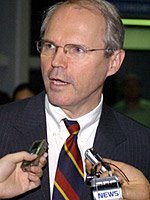Christopher Hill,
U.S. assistant secretary of state for
East Asia and Pacific affairs(Photo AFP)
Ambassador talks policy in San Diego
By David E. Graham
UNION-TRIBUNE STAFF WRITER
January 29, 2006
January 29, 2006
On a stop in San Diego after negotiating political thickets with North Korea and in Cambodia, the U.S. assistant secretary of state for East Asia said political power is shifting from Europe to Asia, and “our country needs to be engaged there.”
“The century of Asia is this time truly upon us,” Ambassador Christopher R. Hill said Friday afternoon.
For two centuries U.S. political alliances with Europe predominated, but growing prosperity and political influence are giving Asia, particularly China, greater clout.
“We need to be out there helping to shape the future,” said Hill, a career foreign service officer.
He was in town to speak Friday night at the University of San Diego's Joan B. Kroc Institute for Peace & Justice, where he reviewed American policy in the region.
He was in town to speak Friday night at the University of San Diego's Joan B. Kroc Institute for Peace & Justice, where he reviewed American policy in the region.
While acknowledging differences with China on some issues, including human rights, he said China will be engaged in the world everywhere the United States is and “we need to understand them.”
In Cambodia a couple of weeks ago, Hill asked Prime Minister Hun Sen for and received the release of four human rights activists jailed for criticizing him.
“It's clear to me Cambodia faces some very serious challenges,” Hill said in the interview. Hun Sen has brought charges over recent months against several people, including a journalist, a union leader and an opposition political figure, who criticized the prime minister. His actions have led diplomats and other analysts to wonder if the country, racked 30 years ago by the Khmer Rouge, is becoming a one-party state.
Hill described the situation as “a very definite concern.”
Hill said that after some involved discussion, Hun Sen said he would release the four activists as “a gift” to Hill, and he did, and days later dropped the charges.
“It was the first time I'd ever received a gift of that kind,” Hill said.
He urged continual engagement with Cambodia in hopes it does not drift the way of neighboring Myanmar, a military dictatorship. He said the rulers of Myanmar, also known as Burma, continue to lack interest in working with the United States.
He said he is encouraged by Indonesia, the world's largest Muslim country, where sentiment toward the United States improved after American tsunami aid. He said Vietnam is embracing a market economy, including Western companies.
Hill, the lead U.S. negotiator in the talks about North Korea's nuclear weapons program, met in Beijing this month with North Korean officials about restarting the talks. The negotiations, hosted by China and also involving Japan, Russia and South Korea, might resume in February.
Secretary of State Condoleezza Rice said last week that the United States wants to resume “immediately,” but North Korea has resisted because of other U.S. policies.
Hill said a key is whether incentives the United States has offered are “truly what they want.”
It might be that they are not, and Kim Jong Il's government wants nuclear weapons and to be isolated. Even if some believe Kim Jong Il is beyond reason, people should not disregard the possibilities the talks could succeed, Hill said.
Before returning to Washington today, Hill said he planned to see his Bowdoin College roommate, Robert Hoehn, of Hoehn Motors, and “hang out with Bob.”
Married with three children, Hill is a former U.S. ambassador to Poland, Macedonia and South Korea. He also speaks Polish, Serbo-Croatian, Macedonian and Albanian.


























No comments:
Post a Comment